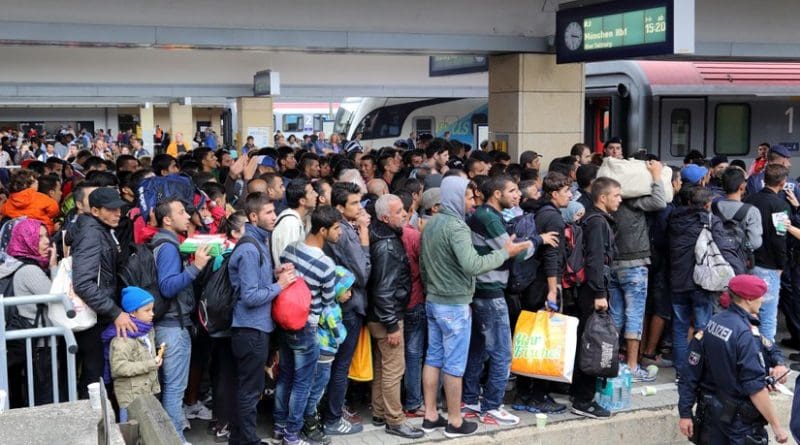Germany Introduces Controls On Austrian Border
By RFE RL
(RFE/RL) — Germany has introduced controls on its border with Austria in an attempt to limit the influx of refugees arriving in the country.
Interior Minister Thomas de Maiziere announced the measure on September 13, saying it might lead to a disruption of railway services.
He said the aim of the checks is “to limit the current inflows to Germany and to return to orderly procedures when people enter the country.”
Hours after Berlin’s announcement, German officers began carrying out the first passport checks near the Austrian border.
The move came as EU interior ministers are to discuss later on September 14 European Commission proposals to redistribute about 160,000 asylum seekers across the bloc.
Germany’s Federal Police agency said it was moving units into the Austrian border area with the aim of limiting uncontrolled entry into the country by people lacking proper documentation.
All trains between Germany and Austria were suspended for 12 hours.
De Maiziere said his country would remain committed to European and national guidelines on protecting refugees.
He said that Europe’s “Dublin rules,” which require asylum seekers to apply in the first EU country they reach, continued to be valid.
The asylum-seekers must understand that “they cannot choose the states where they are seeking protection,” he told reporters.
The European Commission said the decision by Germany appeared legally justified.
“The temporary reintroduction of border controls between member states is an exceptional possibility explicitly foreseen in and regulated by the Schengen Borders Code, in case of a crisis situation,” the European Commission said in a statement.
The statement added that the executive would keep the situation under review.
The commission said the aim would be to return to the normal situation of no border checks between member states of the Schengen zone “as soon as feasible.”
Some 13,015 migrants arrived in Munich on September 12. Germany is expecting 800,000 new arrivals this year.
Around 700 people had arrived at the main station in Munich on the morning of September 13, according to federal police spokesman Simon Hegewald.
Three special trains are due to move the migrants to other parts of the country.
The majority of migrants entering Germany make the journey through Greece, Macedonia, Serbia, Hungary, and Austria. Many of them are escaping war and violence in Syria, Iraq, Afghanistan, and other troubled areas.
German Economy Minister Sigmar Gabriel said in an interview published on September 13 that his country was now reaching its limit as thousands of refugees continue to stream across its borders every day.
“It’s not so much the number of refugees as the speed at which they’re arriving that’s making it so difficult for the states and the municipalities to cope,” he said.
Meanwhile, the flow of migrants into Hungary hit another record on September 12 after a total of 4,330 migrants walked across the border with Serbia.
Hungary has almost finished building a four-meter high 175 kilometer-long, razor-wire fence on its border with Serbia and as of September 15 will enact new rules that criminalize border crossings and speed up decisions about asylum requests.
More than 4,000 Hungarian soldiers will help police enforce the ban on the border.
Hungarian Prime Minister Viktor Orban said German Chancellor Angela Merkel’s decision to relax the asylum laws has caused “chaos.”
Orban, who has taken a hard line on the crisis, told Germany’s Bild newspaper he welcomed the new border controls, saying they were “necessary to protect German and European values.”
The Czech Republic said on September 13 it will boost controls on the border with Austria over the refugee crisis.
Interior Minister Milan Chovanec told Czech Television that Germany’s decision to reimpose border controls with Austria meant the Czech Republic is “now the only bypass” for refugees.
“Further steps will be determined according to the number of refugees heading to the Czech Republic,” Chovanec said.
The United Nations refugee agency (UNHCR) has issued warnings that criminalizing illegal border crossings could violate the UN Convention on Refugees if those crossing are asylum seekers.

